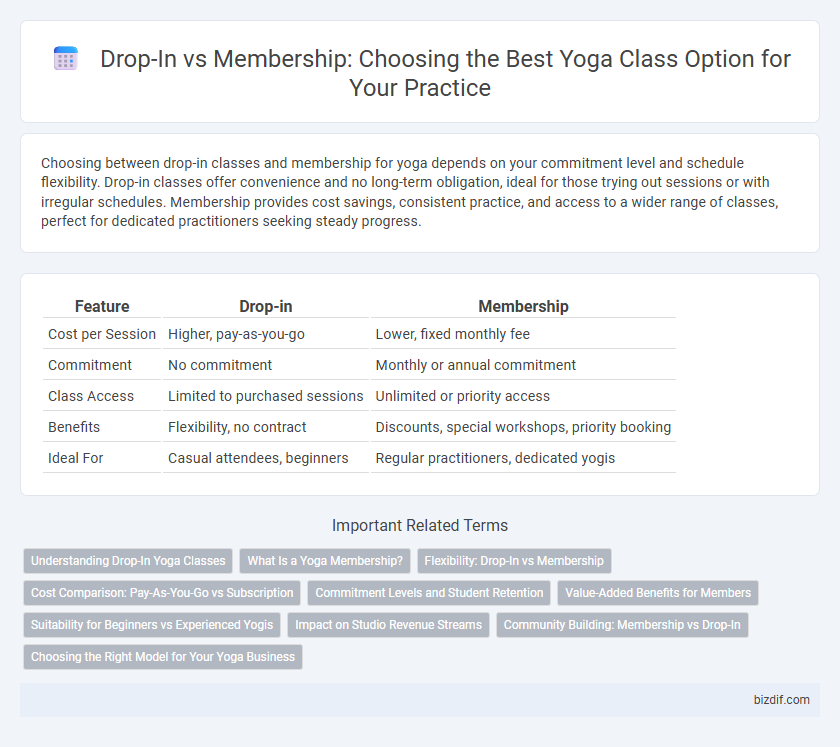Choosing between drop-in classes and membership for yoga depends on your commitment level and schedule flexibility. Drop-in classes offer convenience and no long-term obligation, ideal for those trying out sessions or with irregular schedules. Membership provides cost savings, consistent practice, and access to a wider range of classes, perfect for dedicated practitioners seeking steady progress.
Table of Comparison
| Feature | Drop-in | Membership |
|---|---|---|
| Cost per Session | Higher, pay-as-you-go | Lower, fixed monthly fee |
| Commitment | No commitment | Monthly or annual commitment |
| Class Access | Limited to purchased sessions | Unlimited or priority access |
| Benefits | Flexibility, no contract | Discounts, special workshops, priority booking |
| Ideal For | Casual attendees, beginners | Regular practitioners, dedicated yogis |
Understanding Drop-In Yoga Classes
Drop-in yoga classes offer flexible access to individual sessions without requiring a long-term commitment, making them ideal for beginners and those with unpredictable schedules. These classes typically cost more per session compared to memberships but provide the opportunity to explore different styles and instructors before committing. Understanding the benefits of drop-in options helps practitioners maintain consistency and adaptability in their yoga practice.
What Is a Yoga Membership?
A yoga membership offers unlimited or discounted access to a variety of classes for a fixed monthly fee, providing convenience and cost savings compared to single drop-in sessions. Members benefit from exclusive perks such as priority booking, access to special workshops, and personalized class recommendations. This commitment encourages consistent practice, enhancing physical and mental well-being over time.
Flexibility: Drop-In vs Membership
Drop-in yoga classes provide maximum flexibility for individuals who prefer a casual schedule, allowing attendance without long-term commitments. Membership plans often offer cost savings and access to a broader range of classes but require regular participation and upfront payment. Choosing between drop-in and membership depends on personal availability, frequency of practice, and budget considerations.
Cost Comparison: Pay-As-You-Go vs Subscription
Pay-as-you-go yoga drop-in classes usually cost between $15 and $25 per session, providing flexibility without long-term commitment. Membership subscriptions range from $50 to $150 monthly, offering unlimited classes and often including additional benefits like workshops and discounts. Choosing between drop-in and membership depends on your practice frequency and budget preferences.
Commitment Levels and Student Retention
Drop-in yoga classes offer low commitment, allowing students to attend sessions based on their schedules, which appeals to beginners and casual practitioners. Membership plans provide structured commitment, often resulting in higher student retention by fostering consistent practice and community engagement. Studios benefit from memberships through predictable revenue streams and stronger client relationships that support long-term wellness goals.
Value-Added Benefits for Members
Memberships often provide exclusive value-added benefits such as unlimited class access, priority booking, and discounts on workshops or merchandise, enhancing the overall yoga experience and fostering community engagement. Drop-in passes offer flexibility for occasional attendees but lack the cost efficiency and perks that long-term members enjoy. Committing to a membership can yield higher savings and deeper immersion in the practice through consistent attendance and personalized instructor feedback.
Suitability for Beginners vs Experienced Yogis
Drop-in yoga classes offer flexibility ideal for beginners exploring different styles without long-term commitment, allowing them to attend sessions at their own pace. Membership plans provide experienced yogis with consistent practice opportunities, access to advanced classes, and deeper community engagement essential for skill progression. Choosing between drop-in and membership depends on individual goals, frequency, and commitment level, ensuring optimal growth for all experience levels.
Impact on Studio Revenue Streams
Drop-in classes generate immediate cash flow and attract casual attendees, providing flexible revenue without long-term commitment. Memberships ensure consistent monthly income, improving financial stability and enabling better resource allocation for studio growth. Balancing both options maximizes revenue streams by catering to diverse client preferences and optimizing class occupancy rates.
Community Building: Membership vs Drop-In
Membership fosters a stronger sense of community among yoga practitioners by encouraging regular attendance and deeper connections with instructors and peers. Drop-in classes offer flexibility but may lack the consistent interaction necessary to build lasting relationships. Committed members often benefit from group support, shared goals, and a sense of belonging that enhances their overall yoga experience.
Choosing the Right Model for Your Yoga Business
Selecting the ideal model for your yoga business depends on customer preferences and revenue goals. Drop-in classes offer flexibility and attract casual practitioners who prefer paying per session, while membership models provide steady income and encourage long-term commitment. Analyzing client habits and local market demand helps determine whether drop-in rates or membership plans will optimize growth and profitability.
Drop-in vs Membership Infographic

 bizdif.com
bizdif.com